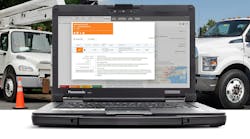While RFID (Radio Frequency Identification) has begun to make inroads in trucking, adoption has been slowed by competing standards known as Ultra High Frequency (UHF) and High Frequency (HF). And now a proposed standards revision intended to help the older HF technology remain competitive with UHF is creating even more uncertainty.
Despite competing standards, RFID technology has become more and more ingrained in transportation, led by toll system applications such as EZ Pass. Recently, for example, the Ports of Los Angeles and Long Beach decided all commercial truckers needed to equip their vehicles with RFID tags from PierPass to access the ports' marine container terminals. While most fleets rely on GPS systems for asset tracking rather than the electronic tag technology, it does offer some potential benefits in fleet applications if standards issues can be dealt with, according to one RFID developer.
Tagsys, a manufacturer and integrator of RFID systems, is attempting to head off potential adoption delays posed by the new HF standard with its “Path to V2” program, which it says combines partnerships, programs and products to provide customers a pain-free upgrade from HF RFID to HF Version 2 (V2). According to Tagsys, it expects the new V2 standard to be approved early this year and commercially available by the summer of 2008.
The company says it has chosen to support V2 because it does not believe that the newer UHF technology has surpassed the older HF in efficiency. “HF is still the preferred technology to use at this time, because UHF is still in the beginning stages of development,” Maria Kaganov, product marketing manager for Tagsys, told Fleet Owner.
While HF has been around for several decades, UHF is still relatively new, although it received a strong endorsement when retail giant Walmart chose to move to UHF in 2003.
Currently, neither technology has captured enough of the market to make the other obsolete, according to Tagsys. “It's a very large market, and some companies have taken the position that UHF is the right solution and some say HF is,” according to Kaganov.
In a partnership with IBM and NXP, Tagsys says it will attempt to make migrating to HF V2 simpler and easier. The revised HF standard will be introduced first in pharmaceutical applications, but should quickly branch out to other applications, according to the company.
Tagsys's Path to V2 includes the Medio L400, the first self-diagnostic and self-correcting long-range HF reader, according to the company. The L400 is HF V2-compatible with a free firmware upgrade, while still supporting other specialized protocols such as ICODE 1, ISO 15693 and UID-OTP. Tagsys also says that administrators can manage and modify 50 separate functions remotely in the Medio L400 in real-time.


